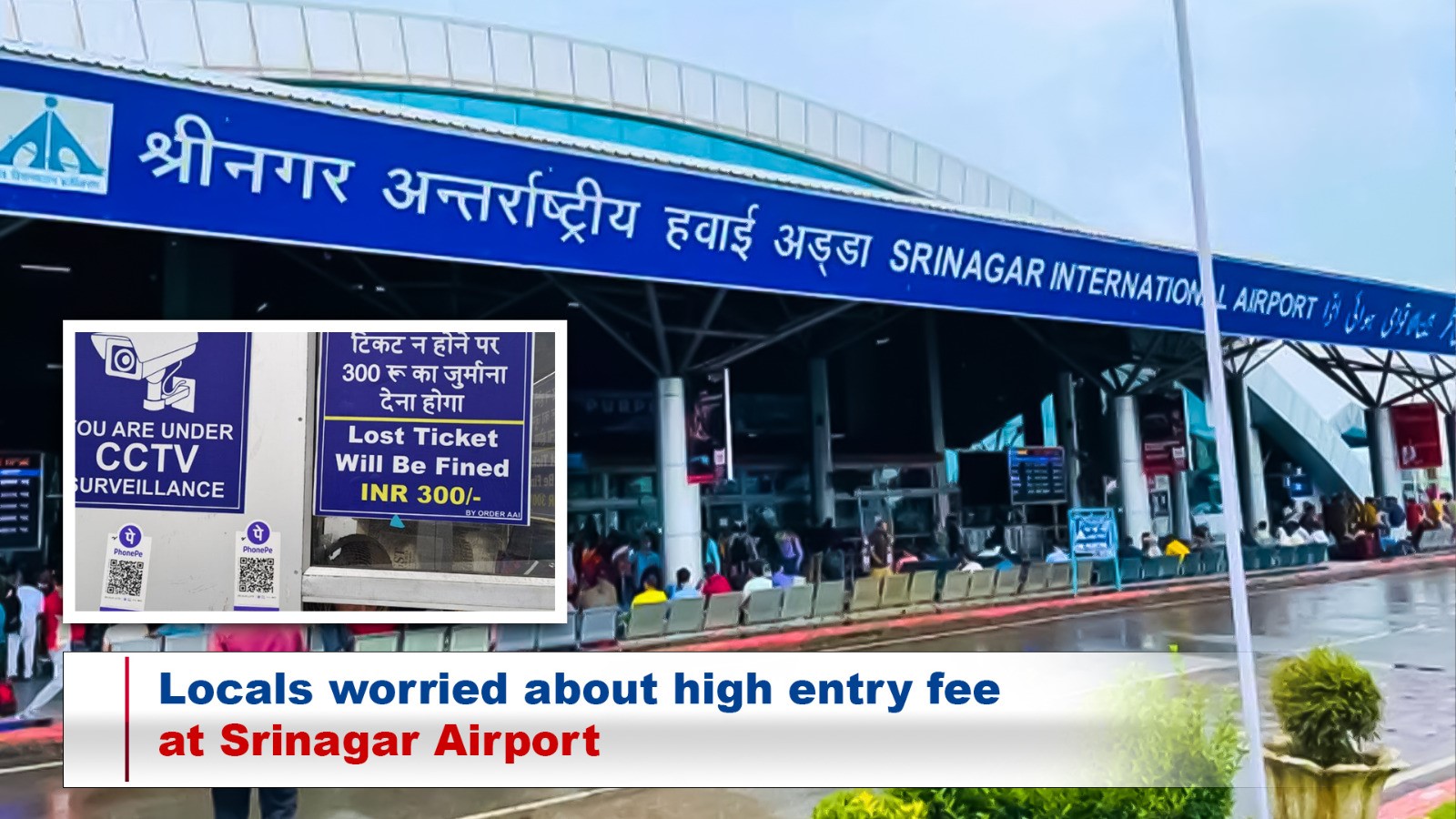Locals Decry Unfair Entry Fee at Srinagar Airport, Calling it a Forced Tax
By: Javid Amin
In the picturesque valley of Kashmir, the Srinagar Airport serves as a gateway for thousands of tourists and residents alike. However, a growing controversy surrounding the imposition of an entry fee at the airport has turned this essential facility into a source of frustration for the local population. What should be a straightforward process—dropping off or picking up a loved one—has been burdened with what many are calling an unjust “forced tax.”
This article explores the widespread dissent among locals, the economic implications of the fee, and the broader impact on tourism and community relations.
The Controversial Entry Fee: An Unpopular Policy
At the heart of the controversy is the airport’s Rs 40 entry fee for all vehicles entering the premises, whether they plan to park or merely drop off passengers. The fee, collected indiscriminately, applies to both private and commercial vehicles, creating inconvenience for frequent commuters and raising questions about its necessity.
- Uniform Application: Regardless of intent—parking or quick drop-offs—drivers are required to pay the fee.
- Scope of Collection: The blanket policy spares no one, affecting tourists, locals, and taxi drivers alike.
Impact on Local Residents and Tourism Stakeholders
Financial Burden on Taxi Drivers
Taxi drivers, a cornerstone of Kashmir’s tourism economy, bear the brunt of this policy. Many of them make multiple trips to the airport daily, and the cumulative cost of the entry fee significantly eats into their earnings.
“We are already struggling with rising fuel prices and operating costs. This entry fee adds another layer of financial pressure,” shared a local taxi driver.
Strain on Families and Frequent Visitors
For local residents, the fee has become a source of frustration and financial strain. Families visiting the airport to drop off or receive loved ones feel the pinch, especially when they must make frequent trips.
Voices of Dissent
The issue has sparked outrage across various sectors of society. Tourism operators, commuters, and everyday citizens have been vocal in their criticism, describing the fee as an unnecessary financial burden.
- Tourism Operators Speak Out:
“The airport is the first point of contact for tourists visiting Kashmir. This entry fee leaves a negative impression and is counterproductive to the government’s efforts to boost tourism,” said a prominent tour operator.
- Public Frustration:
A local resident expressed their disappointment, stating, “Why should we pay Rs 40 just to drop someone off? This is not a service—it’s extortion.”
Economic Discontent: A Non-Local Contractor’s Role
Adding fuel to the fire is the fact that the contract for collecting the entry fee has been awarded to a non-local entity. This decision has drawn criticism from locals who feel it deprives them of economic opportunities.
“The money collected is leaving our region, benefiting outsiders while we bear the cost,” said a concerned citizen.
The absence of a local stakeholder in managing the fee collection exacerbates feelings of alienation and economic exclusion.
Tourism and Accessibility: A Delicate Balance
Kashmir’s tourism sector relies heavily on creating positive first impressions for visitors. The imposition of the entry fee contradicts this goal, potentially deterring travelers and tarnishing the valley’s reputation.
- Ease of Access: Accessibility is a key factor in promoting tourism. Policies that add unnecessary costs or complications discourage travelers.
- Ripple Effects on Local Economy: Beyond tourism, the fee’s financial burden affects small businesses, transport operators, and residents who rely on the airport for connectivity.
Community Demands: Abolish the Fee
The growing discontent has led to widespread calls for intervention. Local residents, tourism stakeholders, and community leaders are urging authorities to abolish the fee or revise the policy to better reflect the needs of the population.
- Proposed Solutions:
- Waiving the fee for vehicles not utilizing parking facilities.
- Introducing exemptions for local residents and taxi drivers who make frequent trips.
- Awarding future contracts to local businesses to ensure the economic benefits stay within the region.
- Unified Appeal: The community is calling for fairness, transparency, and consideration of local needs in administrative decision-making.
Broader Implications: Balancing Sustainability and Fairness
The Srinagar Airport entry fee controversy highlights a larger issue: the need to balance financial sustainability with fairness and accessibility in infrastructure policies.
- Revenue Generation vs. Public Interest: While fees can help maintain facilities, they should not come at the expense of public goodwill and accessibility.
- Engaging Stakeholders: Involving local communities in decision-making processes can help create policies that are both effective and equitable.
Bottom-Line
The controversy surrounding the Srinagar Airport entry fee is a microcosm of larger debates about governance, fairness, and community engagement. As calls for change grow louder, the issue serves as a reminder of the importance of crafting policies that balance financial needs with public interest.
For Kashmir, a region deeply tied to its people and traditions, listening to local voices and prioritizing accessibility is not just good policy—it’s essential for preserving the valley’s unique charm and hospitality.



